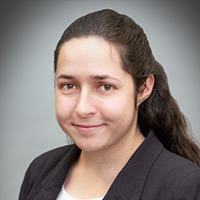Innovative Models for Undergraduate Research Faculty Fellows
The Innovative Models for Undergraduate Research (IMUR) Faculty Fellows program supports CMU faculty who want to “think outside the box” about what undergraduate research or creative inquiry could look like in their discipline. Specifically, how it can scale beyond the 1:1 mentor:student model and better support underrepresented students via innovative approaches to recruitment and inclusive teaching.
Supported by generous grants from the Arthur Vining Davis and Porges Foundations, the IMUR program is divided into three phases: Develop, Implement, and Document. Fellows meet regularly as a cohort to explore and develop their models of undergraduate research, support each other during implementation, and reflect and iterate on their approaches. IMUR team members from the Eberly Center and Undergraduate Research Office worked closely with each Fellow during all phases. To support both faculty and students, Fellows implemented research experiences either within a semester course or in the form of 99-520 summer courses. The latter implementation had the added benefit of providing tuition-free credit to students and additional financial support for faculty teaching.
2022 Fellows
 Jay Aronson
Jay Aronson
Professor
History
Dietrich College of Humanities and Social Sciences
Aronson’s summer research course, “Documenting the History of the Carnegie Mellon University Police Department'', introduced students to archival research methods. Students spent the first few weeks in the classroom acquiring relevant background knowledge on the research topic — the evolution of efforts to achieve campus safety, security, and well-being at Carnegie Mellon -– as well as the skills and tools needed to conduct collaborative historical research. Then, students spent three weeks working alongside archivists in the University Archives. This was followed by several weeks of working remotely to analyze publicly available materials such as historical databases of local newspapers, digital repositories, and the university’s collection of digitized Board of Trustees meeting minutes and meetings with key university personnel to supplement the archival work. By building a strong sense of community in the research group, leveraging archivists’ expertise and support, students were able to produce novel historical scholarship.
 John Chin
John Chin
Assistant Teaching Professor
Institute for Politics and Strategy
Dietrich College of Humanities and Social Sciences
Chin designed his course “Technologies of Rebellion: Collaborative Research in Political Violence” to engage students in the later stages of the research process, namely data analysis and visualization, as well as co-authoring papers. Chin leveraged interdisciplinary teams to mix students and skillsets, with each team focusing on a particular in-progress research project of their choice, with varied topics (e.g. technologies of rebellion and the politics of coups, mass protest, and/or armed insurgency) and research methods. In order to manage 16 students across multiple projects, Chin used a combination of full class and team-specific meetings, as well as peer and self-assessment practices. One group completed coding a dataset of coup geography that he had started; others made large headway with material for an online appendix, writing over 100 pages of historical narratives on self-coup attempts. Several students have since decided to continue the research this fall.
Subha Das
Associate Professor, Chemistry
Mellon College of Science
Das designed his course “Research in the Future Lab - Science in the Cloud” to introduce and train students on the use of a remote and automated cloud lab facility (Emerald Cloud Lab in San Francisco). Leveraging asynchronous online training modules enabled students from a variety of disciplines to participate in the course. The remote nature of the cloud lab allowed Das to work with more students than in a traditional physical lab environment. Focusing on the earlier stages of the research cycle, students learned how to use the Wolfram language/Mathematica based Cloud Lab Command Center interface to remotely interact with the laboratory instruments necessary to prepare samples and solutions in order to conduct the research experiments that they designed. Das has iterated on and taught this course since his IMUR experience and plans to introduce students to cell culture experiments in the future.
Steve Quick
Project Administrator/Manager
Heinz Masters Programs
Heinz College
For his course “Skyglow: Where Have All the Stars Gone?” Quick helped students develop critical research skills of conducting literature reviews, documentation, and communication using the transdisciplinary topic of light pollution as the focus. Quick developed students’ research skills through scaffolded assignments, which included article summaries for working through scholarship, as well as individual interviewing and writing assignments that led up to the final team research project. To support with scaling the research experience, Quick primarily conducted full class meetings for skill development, with built-in opportunities for individual mentorship, and used rubrics for all assignments to fairly and efficiently grade assignments.
 Vickie Webster-Wood
Vickie Webster-Wood
Assistant Professor
Mechanical Engineering
College of Engineering
In her course, “Introduction to Biohybrid and Bioinspired Robotics Research”, Webster-Wood helped students perform targeted literature reviews, identify gaps in the existing literature, design a biohybrid / bioinspired robotics project, and learn key technical communication skills. A combination of hands-on activities, group work, and class discussions enabled students from a variety of disciplines with no background knowledge in biohybrid / bioinspired robotics to successfully engage with the course material. Students learned to identify and explain examples of bioinspired robots (e.g. a robot that moves like a worm) and biohybrid robots (e.g. a robot composed of living muscle tissue as an actuator). Several students have since decided to continue biohybrid / bioinspired research into the fall semester.
 Elizabeth Wayne
Elizabeth Wayne
Assistant Professor
Chemical Engineering
College of Engineering
John Kitchin
Professor
Chemical Engineering
College of Engineering
 Vickie Webster-Wood
Vickie Webster-Wood
Principal Librarian, University Libraries
Melanie Gainey
Principal Librarian, University Libraries
Wayne, Kitchin, Young, and Gainey created the course “Information Overload: Systematic Methods for Understanding what we Know” to engage students from all backgrounds in knowledge synthesis. Knowledge synthesis is a research methodology that allows one to collect all of the relevant information on a topic in a systematic way in order to summarize that research and understand its gaps. Using the field of cancer immunotherapy as a focus, this team of instructors mentored students on how to deal with information overload by giving students a data science toolkit to gather and assess research information. Through group meetings and individual assignments, students pursued questions of personal interest to them and at their own pace. Because the research did not require physical laboratory space, they were able to conduct this research remotely, accommodating students who were not spending their summers on campus.